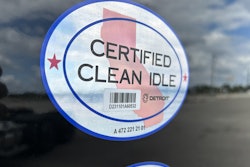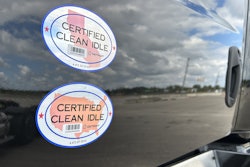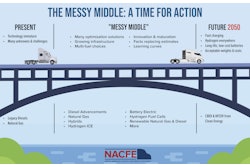Seventeen businesses, environmental advocates and public health organizations on Monday sent a letter to North America's truck and engine manufacturers urging them to remain committed to the Clean Truck Partnership (CTP) agreed to in 2023.
The Clean Truck Partnership is an agreement between the California Air Resources Board (CARB) and Cummins, Inc., Daimler Trucks North America, Ford Motor Company, General Motors Company, Hino Motors Limited, Inc., Isuzu Technical Center of America, Inc., Navistar, Inc., Paccar Inc., Stellantis N.V., Truck and Engine Manufacturers Association, and Volvo Group North America. CARB said the partnership “marks a commitment from the companies to meet California’s vehicle standards that will require the sale and adoption of zero-emissions technology in the state, regardless of whether any other entity challenges California’s authority to set more stringent emissions standards under the federal Clean Air Act.”
There is, however, debate over the validity of the agreement now that the Advanced Clean Trucks and CARB's Omnibus regulations have been revoked by Congress. The Western States Trucking Association in June filed a petition with California’s Office of Administrative Law (OAL) challenging the CTP. Nebraska Attorney General Mike Hilgers in November filed an antitrust lawsuit against the truck makers over the agreement.
"It is disturbing to watch truckmakers flirt with abandoning their commitment to go electric. Their diesel trucks will cost hundreds of thousands of lives and trillions of dollars in health-related damage," said Adam Zuckerman, senior clean vehicles campaigner with Public Citizen’s Climate Program. Public Citizen is among the letter signatories. "Without a clear and public recommitment to the Clean Trucks Partnership, manufacturers will continue to pollute our air and poison our communities while undermining the hundreds of businesses investing in electric trucks."
The signatories of the letter, a copy of which was obtained by CCJ, expressed their concern over the OEMs' "silence, equivocations, and statements undercutting the validity of the (CTP), an agreement initially championed by your companies... This is no time for equivocation and backpedalling. The purpose of the Clean Trucks Partnership is to provide a clear path forward for industry and the public despite federal policy churn."
Under the terms of the CTP, the OEMs committed "to meet, in California, the relevant provisions of the CARB regulations set forth in Appendices A and B, and any agreed upon modifications to such regulations as set forth in this agreement, irrespective of the outcome of any litigation challenging the waivers or authorizations for those regulations or of CARB’s overall authority to implement those regulations."
The two sides are at odds over whether the revocation of the waivers that allowed CARB to establish its ACT and Omnibus regulations also rendered the CTP moot. The revocations themselves are being litigated by the state of California.
Reached Monday by CCJ, Clean Freight Coalition (CFC) Executive Director Jim Mullen said he continues to believe that the CTP is invalidated since the tentpoles propping up CARB's ability to set its own emissions requirements have now been removed. The CFC is referenced in the group's letter as an instigator of sorts for encouraging truck and engine OEMs to abandon the CTP.
The counterpoint, the letter says, is that CARB's emissions waivers were never make-or-break conditions for the CTP.
"In signing onto the Clean Trucks Partnership, truck and engine manufacturers and the Truck & Engine Manufacturers Association (EMA) made a commitment with the state of California to continue to meet the state's truck emissions rules even if California lost the federal authority to implement those rules," the letter reads. "In so doing, signatories secured for themselves real benefits with mutually agreed commitments to flexibilities and new program designs that industry selected as a condition for agreement. With the political tides bound to change again, backing out of this deal will negatively impact future dealings with California regulators. Plus, California and other Section 177 states need emissions reductions from the trucking sector to meet their obligations and will pursue means to achieve them in one way or another."
The political tides are currently ebbing on emissions regulations. Late last month the Trump administration proposed a draft to roll back greenhouse gas rules for heavy truck dating to 2011 and running into the next decade. A federal rule, GHG3 in no way impacts the CTP. Its potential repeal, however, and the revocation of ACT and the Omnibus rule, show clearly the current political climate does not favor more regulation.
In their letter, the groups claim inaction by truck and engine OEMs not only puts the U.S. behind from a technology perspective but also threatens "both market certainty and public health."
Citing a study by the Finland-based Centre for Research on Energy and Clean Air (CREA), the letter claims diesel pollution produced by 10 years of truck sales from major manufacturers Daimler Truck, Traton, Volvo Group, and Paccar are linked to 307,000 deaths worldwide and more than $1.4 trillion in global health costs by 2040.
"[It's] more important than ever that signatories hold firm on the CTP. We call on the signatories of the Clean Trucks Partnership to stop the silence and undercutting," the letter reads. "Instead, you must reaffirm your commitment – to this agreement and to the truck drivers, fleets, and communities who stand to benefit from electrification – and demonstrably increase your efforts to electrify the medium and heavy duty trucking sector. The future of the US trucking sector is in your hands."
The signatories of the letter Monday are Acterra EV; Charging for All Coalition; Alliance of Nurses for Healthy Environments; California Environmental Voters; California Interfaith Power & Light; Center for Biological Diversity; Electric Vehicle Association; Environment California; Evergreen Action; GreenLatinos; Labor Network for Sustainability LNS; League of Conservation Voters (LCV); Native Sun Community Power Development; Neighbors for Clean Air; NRDC (Natural Resources Defense Council); Oregon Business for Climate; Public Citizen; and Sierra Club.











